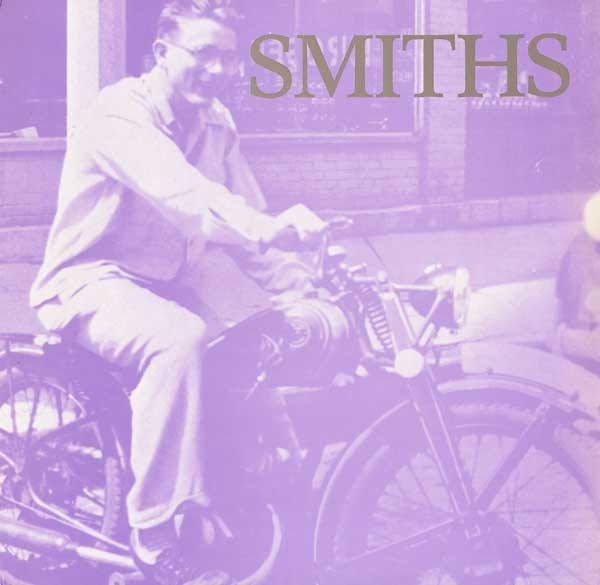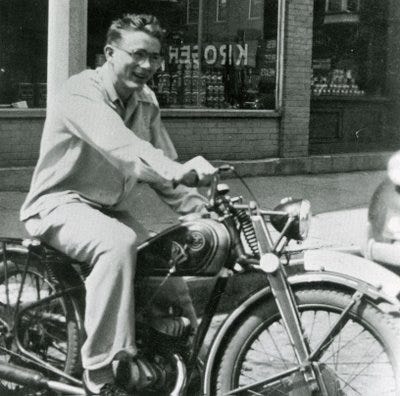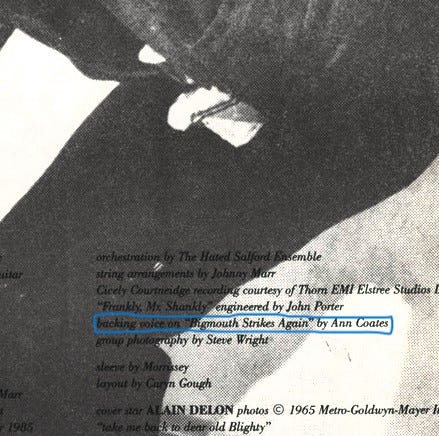The Smiths' 12th single, 'Bigmouth Strikes Again' was released May 19, 1986 and reached number 26 on the UK Singles Chart. 'Money Changes Everything' appears on the B-side of the 7-inch single, with the addition of 'Unlovable' on the 12-inch version. 'Bigmouth Strikes Again' is one of only two singles with only the word "Smiths" on the cover (the other single is "Panic"). The song is the 6th track on The Queen Is Dead1 studio album, which was released the following month.
The single's cover art consisted of a photograph of a bespeckled James Dean on a motorcycle, and dates from 1948. While the back cover of the single can be construed to credit David Loehr2 for the photograph of Dean, he only provided it to the Smiths for their use. The photographer was Nelva Jean Thomas3, who was a childhood friend of Dean. She took the photograph in Dean's hometown, Fairmount, Indiana. The motorcycle is a 1947 Czech Whizzer, bought for him by his uncle Marcus Winslow4.
Both the UK 7 and 12-inch singles had etchings on their respective runouts: "BEWARE THE WRATH TO COME" on the A-side, and "TALENT BORROWS, GENIUS STEALS" on the B-side. The former etching is taken from a banner briefly seen in the 1954 film Hobson's Choice5, which can be presumed to be a favorite of Morrissey. The latter etching is of course a maxim from Morrissey's favorite author, Oscar Wilde.

It is understood that the genesis of the song was in the form of an instrumental that was rehearsed at soundchecks while the Smiths were on the Meat Is Murder tour in the spring of 1985. Morrissey wrote the lyrics, which were composed around the song’s title, over the summer of 1985. 'Bigmouth Strikes Again' is but one of three songs Morrissey wrote that summer to vent his frustrations with the music industry. The other two songs being ‘The Boy With The Thorn In His Side’ and ‘Rubber Ring’.
By September 1985 the Smiths were in RAK Studios in London to record the song. Morrissey and Johnny produced the recording, with Stephen Street acting as recording engineer on the track.
The Smiths invited singer and songwriter Kirsty MacColl to the studio to provide backing vocals on the song. According to Johnny Marr, “That’s the first time we met her. She came down to the studio and put on these really weird harmonies.” Apparently they did not think that MacColl's vocals added any value to the track, so they were removed from the final mix (performed in October 1985 at Jacobs Studios in Farnham, Surrey). Instead, Morrissey provided the backing vocals using a harmonizer, which in the final mix were sped-up to the point where they bear no resemblance to his voice. Morrissey's backing vocals were credited to ‘Ann Coates’ on the album, which is a play on words of the Ancoats area of Manchester.
Johnny Marr sought out a sound similar to that found on the Rolling Stones' 'Jumpin' Jack Flash' when composing the music for the song:
"With 'Bigmouth Strikes Again', I was trying to write my 'Jumping Jack Flash.' I wanted something that was a rush all the way through, without a distinct middle eight as such. I thought the guitar breaks should be percussive, not too pretty or cordial -- I wanted a cheap, Les Paul sort of sound. The main riff is based on an Am shape, with a capo at the 4th fret. I buried this one little guitar part in just the right place, so it sounds like overtones of the main part, but it's really there. On the first of the two breaks, I'm playing slide through an AMS harmonizer, really high. For the second one, I used a Gibson Les Paul Black Beauty and a Rickenbacker together, playing a regular Em shape, but it's sampled and triggered off the snare drum roll. "6
Some have surmised that Johnny Marr may have "borrowed" the intro to 'Crazy On You' (1976) by Heart (an American-Canadian band) when composing the intro for
Keep reading with a 7-day free trial
Subscribe to Morrissey, Ringleader of The Tormentors to keep reading this post and get 7 days of free access to the full post archives.




